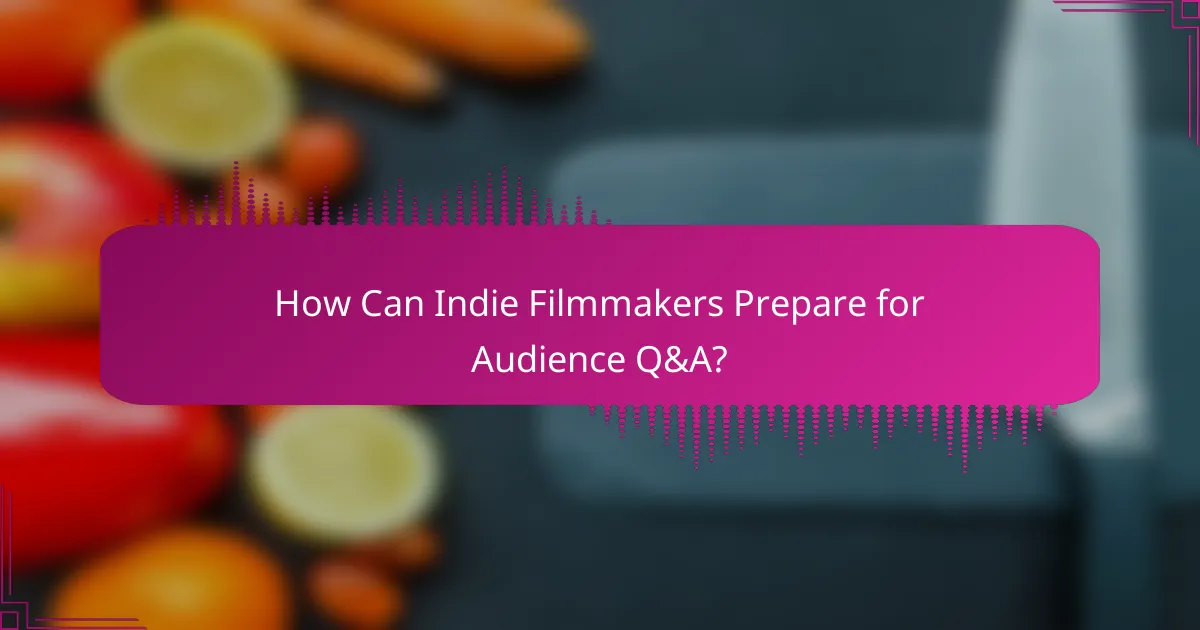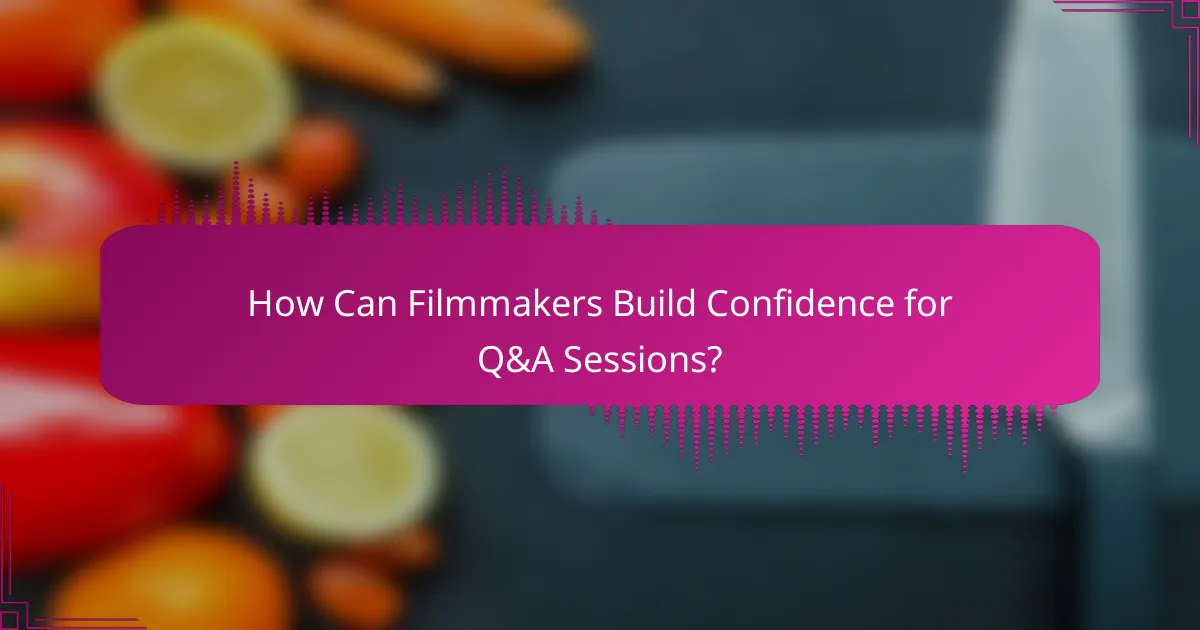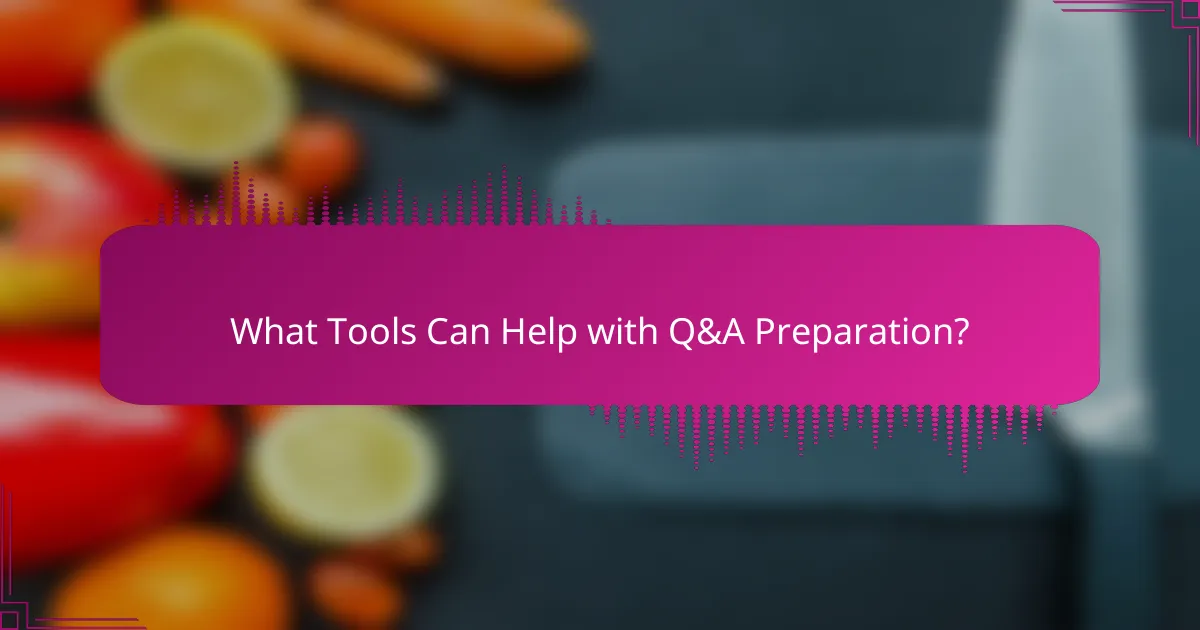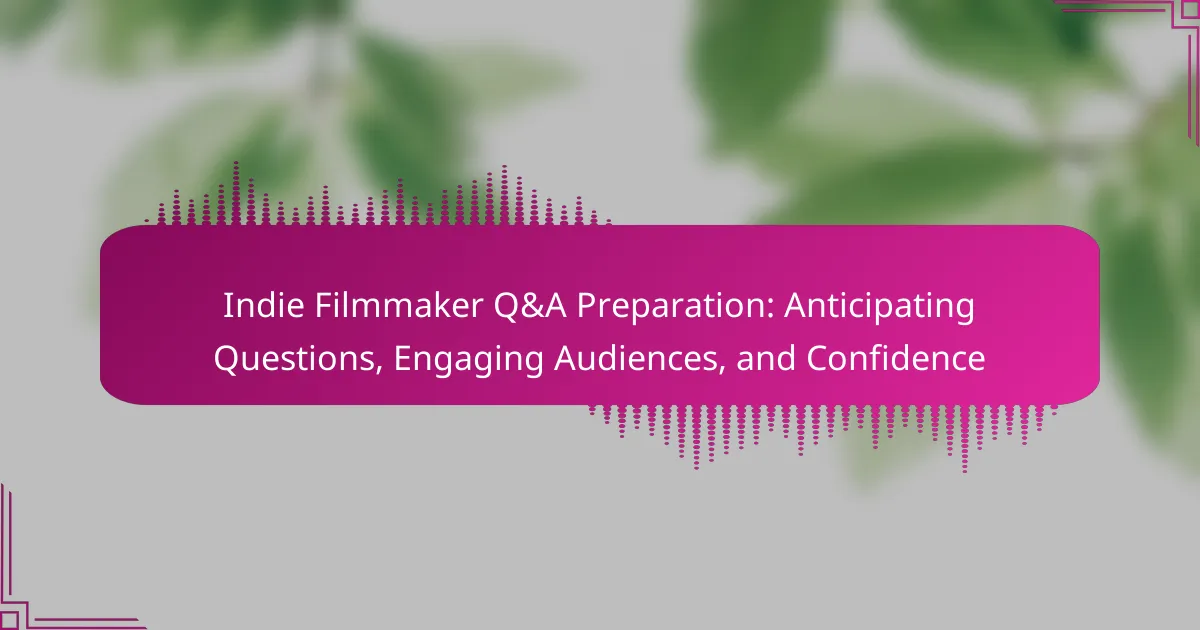Preparing for audience Q&A sessions is essential for indie filmmakers, as it allows them to anticipate common questions and practice their responses. By fostering interaction and creating a two-way communication channel, filmmakers can enhance viewer interest and build confidence, leading to a more engaging experience for everyone involved.

How Can Indie Filmmakers Prepare for Audience Q&A?
Indie filmmakers can prepare for audience Q&A sessions by anticipating common questions, practicing their responses, and engaging with feedback from previous screenings. This preparation helps build confidence and ensures a more engaging experience for both the filmmaker and the audience.
Research common questions
Identifying common questions that audiences typically ask can significantly enhance your Q&A performance. Look for insights from other filmmakers, film festivals, and online forums to compile a list of frequently asked questions. Typical inquiries may include topics like the inspiration behind the film, production challenges, and character development.
Consider creating a document that categorizes these questions into themes, such as technical aspects, narrative choices, and personal experiences. This will help you prepare targeted responses that resonate with the audience’s interests.
Practice responses with peers
Practicing your responses with peers can provide valuable feedback and boost your confidence. Organize practice sessions where you simulate a Q&A environment, allowing friends or colleagues to ask questions as if they were the audience. This approach helps you refine your answers and become more comfortable speaking about your film.
Encourage your peers to provide constructive criticism on your delivery and content. This feedback can highlight areas for improvement and help you articulate your thoughts more clearly during the actual event.
Utilize feedback from previous screenings
Feedback from previous screenings is a goldmine for preparing for future Q&A sessions. After each screening, take note of the questions that audience members ask and any comments they make about your film. This information can guide you in addressing common curiosities and concerns in future discussions.
Consider keeping a log of this feedback to track recurring themes and questions. This will not only prepare you for similar inquiries but also demonstrate to your audience that you value their input and are open to dialogue.
Develop a concise project summary
A concise project summary is essential for framing your film during the Q&A. This summary should encapsulate the film’s core themes, objectives, and unique aspects in just a few sentences. Aim for clarity and brevity, ensuring that you can convey the essence of your film quickly.
Having this summary ready allows you to set the stage for audience questions and provides context for your responses. It can also serve as a useful reference point if the conversation veers into complex territory.
Engage in mock Q&A sessions
Mock Q&A sessions can simulate the real experience and help you prepare effectively. Invite a small group of trusted individuals to participate, and treat the session as if it were a live event. This practice can help you become accustomed to thinking on your feet and responding to unexpected questions.
Record these sessions if possible, allowing you to review your performance and identify areas for improvement. Focus on your body language and tone, as these non-verbal cues can significantly impact audience engagement during the actual Q&A.

What Are Effective Strategies for Engaging Audiences?
Engaging audiences effectively involves fostering interaction and making the content relatable. By creating a two-way communication channel, filmmakers can enhance viewer interest and retention.
Encourage open dialogue
Open dialogue invites audience participation, making them feel valued and involved. Start by asking questions during your presentation or screening, and allow time for audience responses. This interaction can lead to deeper insights and a more dynamic experience.
Consider using platforms like social media or live Q&A sessions to facilitate ongoing discussions. This approach not only engages viewers but also builds a community around your work.
Incorporate storytelling techniques
Storytelling is a powerful tool for engagement, as it resonates emotionally with audiences. Use personal anecdotes or behind-the-scenes stories to connect your experiences with the film’s themes. This makes the content more relatable and memorable.
Structure your narrative to include conflict and resolution, drawing viewers into the journey. Highlighting character arcs or pivotal moments can also enhance audience investment in your story.
Use visual aids to enhance understanding
Visual aids can significantly improve audience comprehension and retention. Incorporate slides, clips, or infographics that complement your discussion points. This not only breaks up the monotony but also reinforces key messages visually.
Ensure that your visuals are clear and relevant. For example, using a short clip from your film can illustrate a point effectively, making it easier for the audience to grasp complex ideas.
Personalize responses to audience interests
Tailoring your responses to audience interests can enhance engagement and satisfaction. Pay attention to audience demographics and preferences, and adjust your content accordingly. This could mean focusing on specific themes or aspects of your film that resonate with them.
During Q&A sessions, listen actively to questions and provide thoughtful, personalized answers. This approach not only shows respect for their input but also fosters a deeper connection with your audience.

What Common Questions Should Indie Filmmakers Anticipate?
Indie filmmakers should prepare for a range of questions that delve into their creative process, production challenges, and thematic choices. Anticipating these inquiries can enhance audience engagement and demonstrate confidence during discussions.
What inspired your film?
Inspiration can stem from personal experiences, societal issues, or even other films. Indie filmmakers often draw from their own lives or the lives of those around them to create relatable narratives.
Consider sharing specific moments or influences that sparked your creativity. For example, a filmmaker might cite a significant event or a piece of art that shaped their vision.
What challenges did you face during production?
Production challenges can vary widely, including budget constraints, scheduling conflicts, and technical difficulties. Indie filmmakers often work with limited resources, making problem-solving skills essential.
Discussing these obstacles can provide insight into your resilience and adaptability. Highlight specific instances, such as a last-minute location change or issues with equipment, to illustrate your experience.
How did you choose your cast and crew?
Selecting the right cast and crew is crucial for bringing a film to life. Indie filmmakers typically prioritize talent and chemistry over star power, often holding auditions or seeking recommendations.
Explain your selection process, whether it involved casting calls, workshops, or personal connections. Sharing anecdotes about how you found the perfect fit for a role can engage your audience.
What themes are explored in your film?
Themes are the underlying messages or concepts that give depth to a film. Indie filmmakers often explore complex issues such as identity, love, or social justice, which resonate with audiences.
Articulate the key themes in your film and how they relate to current societal conversations. Providing examples of scenes that embody these themes can help clarify your vision and intent.

How Can Filmmakers Build Confidence for Q&A Sessions?
Filmmakers can build confidence for Q&A sessions by preparing thoroughly, practicing their speaking skills, and adopting a positive mindset. Engaging with the audience and anticipating questions can significantly enhance their comfort level during these interactions.
Practice public speaking techniques
Improving public speaking skills is essential for filmmakers facing Q&A sessions. Techniques such as maintaining eye contact, using appropriate body language, and varying vocal tone can make a significant difference. Consider joining local speaking clubs or workshops to refine these skills in a supportive environment.
Rehearsing responses to common questions can also help. Practicing in front of friends or colleagues can provide valuable feedback and help filmmakers become more comfortable with their material.
Visualize successful interactions
Visualization is a powerful tool for building confidence. Filmmakers should take time to imagine themselves successfully engaging with the audience, answering questions, and receiving positive reactions. This mental rehearsal can help reduce anxiety and create a more positive outlook.
Setting aside a few minutes each day for visualization can be beneficial. Picture the venue, the audience’s expressions, and the flow of the conversation to create a vivid mental image of success.
Prepare for difficult questions
Anticipating challenging questions is crucial for filmmakers to feel confident during Q&A sessions. Research common inquiries related to their film’s themes, production challenges, or character motivations. Preparing thoughtful responses can alleviate the fear of being caught off guard.
Consider creating a list of potential tough questions along with well-crafted answers. This preparation can help filmmakers respond calmly and effectively, demonstrating their expertise and passion for their work.
Focus on positive audience feedback
Filmmakers should concentrate on the positive feedback they receive from audiences. Engaging with viewers who express appreciation for their work can boost confidence and reinforce their passion for filmmaking. Remembering these positive interactions can help counterbalance any negative experiences.
Keeping a record of compliments or constructive feedback can serve as a reminder of the impact their work has on others. This practice can help filmmakers maintain a positive mindset leading up to and during Q&A sessions.

What Tools Can Help with Q&A Preparation?
Effective Q&A preparation for indie filmmakers involves various tools that enhance engagement and build confidence. These tools can range from workshops to online platforms designed to refine your skills and anticipate audience questions.
Filmmaking workshops
Filmmaking workshops provide hands-on experience and expert guidance that can significantly improve your Q&A skills. These workshops often focus on storytelling, audience engagement, and public speaking, which are crucial for effective communication during Q&A sessions.
When selecting a workshop, consider factors such as the instructor’s experience, the workshop’s format (in-person or online), and its focus areas. Look for workshops that include practical exercises, allowing you to practice responding to questions in a supportive environment.
Common pitfalls to avoid include choosing workshops that lack interaction or feedback. Aim for sessions that offer opportunities to engage with peers and receive constructive criticism, as this will better prepare you for real-life Q&A scenarios.
